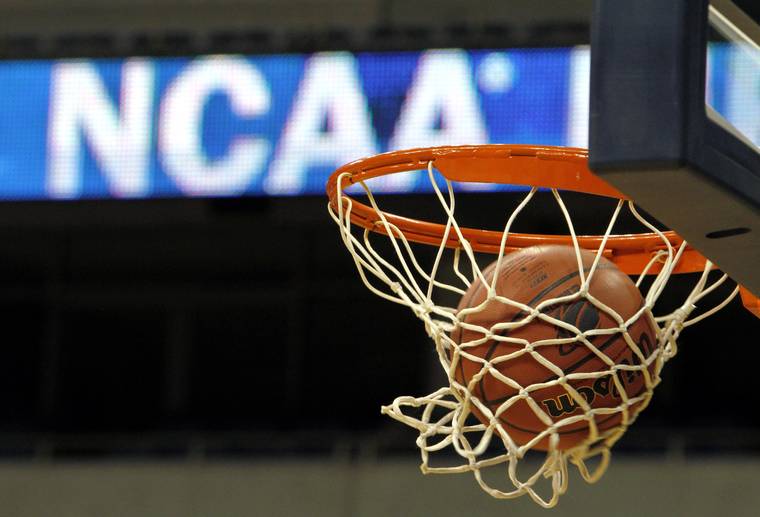SACRAMENTO, Calif. — Defying the NCAA, California opened the way Monday for college athletes to hire agents and make money from endorsement deals with sneaker companies, soft drink makers, car dealerships and other sponsors, just like the pros.
The first-in-the-nation law, signed by Democratic Gov. Gavin Newsom and set to take effect in 2023, could upend amateur sports in the U.S. and trigger a legal challenge.
Newsom and others cast it as an attempt to bring more fairness to big-money college athletics and let players share in the wealth they create for their schools. Critics have long complained that universities are getting rich off the backs of athletes — often, black athletes struggling to get by financially.
“Other college students with a talent, whether it be literature, music, or technological innovation, can monetize their skill and hard work,” the governor said. “Student athletes, however, are prohibited from being compensated while their respective colleges and universities make millions, often at great risk to athletes’ health, academics and professional careers.”
Newsom predicted other states will introduce similar legislation.
The NCAA — which had called on him to veto the bill, arguing that it would destroy the distinction between amateurs and pros and give California an unfair recruiting advantage — said it is considering its next steps. It did not elaborate.
In a statement, the NCAA said it is working to revise its rules on making money off a player’s name and likeness. But it said any changes should be made at the national level through the NCAA, not through a patchwork of state laws.
California’s law applies to students at both public and private institutions — but not community colleges — in the nation’s most populous state. While the measure covers all sports, the big money is in football and basketball.
Student athletes won’t get salaries. But under the law, they can’t be stripped of their scholarships or kicked off the team if they sign endorsement deals.
There are some limitations: Athletes can’t enter into deals that conflict with their schools’ existing contracts. For example, if your university has a contract with Nike, you can’t sign with Under Armour.
The law represents another instance of California jumping out in front of other states when it comes to social and political change. The movement to allow student athletes to profit from their labors on the court or the playing field has been simmering for years, portrayed as a matter of economic fairness and civil rights.
“A majority of these athletes, it’s no secret, are African American,” said Sen. Steven Bradford, a co-author of the bill who is black. “It’s an issue of fairness, and it’s an issue that has been long overdue.”
Newsom tweeted a video showing him signing the law during a special episode of HBO’s “The Shop: Uninterrupted” alongside NBA superstar LeBron James, one of many professional athletes who have endorsed the measure.
James, whose 14-year-old son is a closely watched basketball prospect in Los Angeles and will be 18 when the law takes effect, exulted over its signing on Instagram, saying it will “change the lives for countless athletes who deserve it!”
He added: “NCAA, you got the next move. We can solve this for everyone!”
NBA rookie Jordan Poole of the Golden State Warriors also welcomed the new law. Six months ago, as a player at the University of Michigan, he hit a game-winning shot at the buzzer in the second round of the NCAA tournament as millions watched on TV.
“I know for sure I would have been using my name after that Houston shot,” he said.
His teammate, three-time NBA champion Draymond Green, went further.
“The NCAA is a dictatorship,” the former Michigan State star told reporters Monday. “I’m tired of seeing people get ripped off, and I’m tired of seeing these college athletes being ripped off.”
Before the governor signed the law, the NCAA threatened to bar California universities from competition, meaning powerhouses like the University of Southern California, UCLA, Stanford and the University of California, Berkeley, could find themselves banned.
If that were to happen, California schools could form a new governing body and get schools from like-minded states to join, in a threat to the NCAA’s dominance.
But the governor, a former college baseball player, said he doubts the NCAA would kick California schools out, arguing that the state’s 40 million people and status as the world’s fifth-largest economy make it too big to lose.
The NCAA “can’t afford to do that,” he said.
Democratic state Sen. Nancy Skinner, the bill’s author, said it could especially help female athletes, who have limited opportunities for professional sports once they leave college.
“College is the primary time when the spotlight is on” them, Skinner said. “For women, this might be the only time they could make any money.”
NCAA rules bar players from hiring agents. The NCAA has also steadfastly refused to pay players in most cases. But a committee is studying other ways players could make money. Its report is expected in October.
The NCAA does let some athletes accept money in some instances. Tennis players can accept up to $10,000 in prize money per year, and Olympians can accept winnings from their competitions. Also, many schools pay players yearly cost-of-living stipends of $2,000 to $4,000.
“We just kind of joked every kid is going to want to go to college out here in Cali now,” Warriors forward Glenn Robinson III, who played college ball at Michigan, said of the new law.
“I think it’s time. A lot of people are waking up and starting to see how much money that these universities are making off of players,” he added. “Where I went to school, a lot of players couldn’t afford lunch.
———
AP sports writer Janie McCauley contributed reporting from San Francisco.


